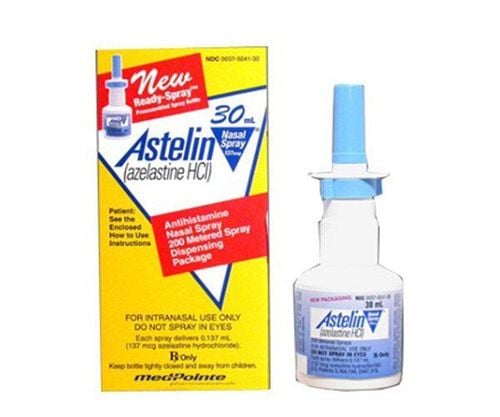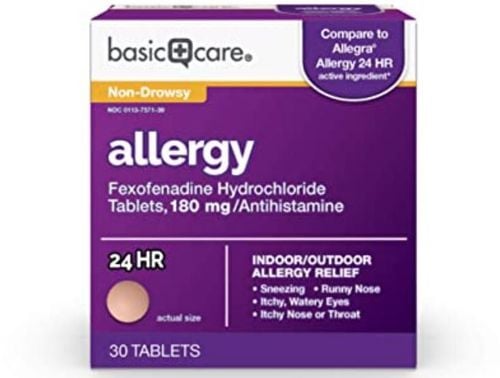This is an automatically translated article.
Zymine drug has the main effect of anti-allergic, relieves symptoms of dry cough caused by irritation or common cold. To use the drug safely, please refer to the information about Zymine through the article below.1. What does Zymine do?
Zymine drug has the main ingredient Triprolidine, which is made in the form of a solution of 1.25mg/5ml.
Triprolidine is a 1st generation antihistamine, which competes with the Histamine receptor and causes drowsiness, mild cough relief. In addition, by blocking the natural substance acetylcholine, Triprolidine helps to dry up certain body fluids to reduce symptoms such as watery eyes and runny nose.
Zymine is used to relieve symptoms of allergies, hay fever, and the common cold. These symptoms include rash, itchy eyes/throat/nose, watery eyes/nose, skin rash, and sneezing.
This medication is commonly used to treat allergy symptoms in children over 6 years of age and adults, and for children under 6 years of age has not been shown to be safe or effective.
2. Usage and dosage of Zymine
How to use: The drug is prepared in oral form. You must take the medicine on a full stomach to reduce irritation on the digestive tract.
Dosage:
For adults and children over 12 years old: Dosage is 2.5mg (10ml) every 4-6 hours; up to 10mg/day. Usually prescribed in tablet form. Children 6 - 12 years old (using syrup): Take 1.25mg (1 teaspoon), every 4-6 hours; not more than 5mg/day. Patients with hepatic and renal impairment should be used with caution and may need to change the dose.
Overdose:
An overdose of the drug can cause symptoms of depression or irritation of the central nervous system, leading to very low blood pressure, shortness of breath, convulsions, loss of consciousness, feeling very dry mouth/nose/throat, high fever, convulsions. Overdosage of H1 receptor antagonists can lead to CNS depression, hyperthermia, anticholinergic syndrome, tachycardia, hypotension/hypertension, nausea, vomiting, agitation, confusion confusion, hallucinations, psychosis or arrhythmia. Rhabdomyolysis and acute renal failure may rarely develop in patients with prolonged agitation, coma, or convulsions. Triprolidine overdose should be stopped immediately. If possible, induce vomiting, take activated charcoal. Followed by symptomatic and supportive treatment.
3. What are the side effects of Zymine?
Common side effects: Drowsiness, dizziness, feeling tired, poor coordination. Uncommon: Blurred vision; Urinary retention, little urination, dry mouth, nose, throat; Chest pain, headache. Rare: Agranulocytosis/neutrophils/platelets, hemolytic anemia, orthostatic hypotension, tinnitus, allergic reactions to drugs and cross-immunity with other drugs, mania, irritation, especially in young children, causing insomnia, irritability, tachycardia, tremors, convulsions. Increases the occurrence of seizures in people with focal lesions on the cerebral cortex. When taking the drug, you should tell your doctor about any side effects that occur. If you experience serious side effects, seek medical attention immediately.
4. Things to note when taking Zymine
Triprolidine is contraindicated in patients who are allergic to Zymine, acute asthma attacks, angle-closure Glaucoma and children under 6 years of age.
People with severe liver failure or drinking alcohol when taking Zymine will increase the risk of drowsiness.
Caution should be exercised when using Triprolidine for people with renal failure and the dosage must be reduced; The elderly and young children are prone to side effects of the drug (central nervous system depression, hypotension), symptoms are often more severe, so when used with caution.
Because this drug has an antimuscarinic effect, it should be used with caution in people with prostate enlargement, urinary retention due to many causes, and pyloric stenosis.
Caution should be exercised when giving Zymine to people with epilepsy because it can sometimes cause seizures.
Triprolidine must be stopped 4 days before an allergic skin reaction test. Because taking this drug affects the result of the reaction.
Measure the amount of liquid medicine carefully. Use the supplied dosing syringe or Zymine dosing device to avoid the risk of taking too little or too much of the drug. See your doctor if your symptoms do not improve after 7 days of taking the medicine or you develop a fever, rash, or headache.
Zymine may make you dizzy, drowsy, or have blurred vision. These symptoms are worse if alcohol or marijuana is taken along with the medication. Therefore, patients should not drive, use machines, or do anything that requires alertness or clear vision while taking this medicine.
During pregnancy, the drug should only be used when absolutely necessary.
The drug passes into breast milk and may cause a reaction in the infant. Consult your doctor before breastfeeding.
Drug Interactions: Do not use Zymine with other antihistamines, including topical ones such as Diphenhydramine cream, ointments, sprays because of the potential for increased side effects. Some other drugs that cause interactions include: Opioid pain relievers or cough suppressants (such as Codeine, Hydrocodone); sleeping or anxiety relievers (such as Alprazolam, Lorazepam, Zolpidem); muscle relaxant (Carisoprodol)...
Store the drug in a cool, dry place and avoid direct light. Keep the medicine in a place out of reach of children.
Hopefully with the above information you have known the effects and notes when using Zymine medicine. If you have any questions about Zymine, you need to tell your treating doctor/pharmacist for answers.
Please dial HOTLINE for more information or register for an appointment HERE. Download MyVinmec app to make appointments faster and to manage your bookings easily.













